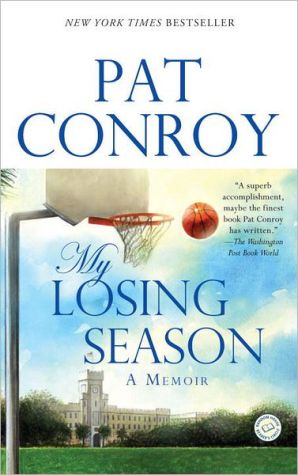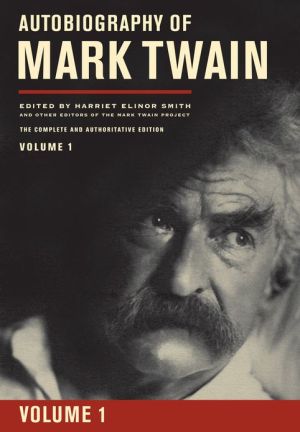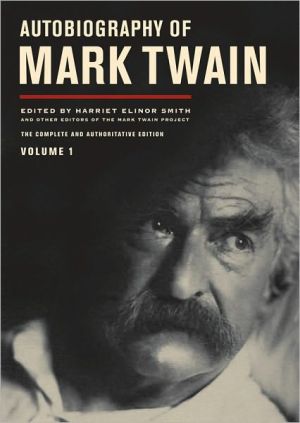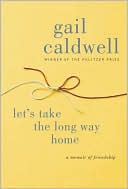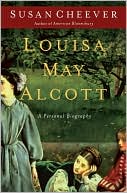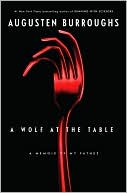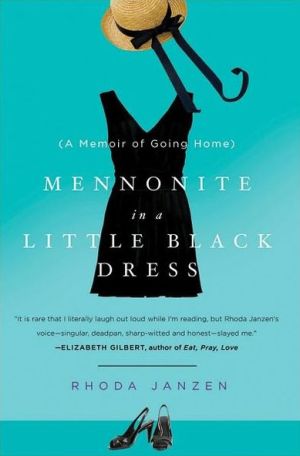My Losing Season
NEW YORK TIMES BESTSELLER\ Pat Conroy, one of America’s premier novelists, has penned a deeply affecting coming-of-age memoir about family, love, loss, basketball—and life itself. During one unforgettable season as a Citadel cadet, Conroy becomes part of a basketball team that is ultimately destined to fail. And yet for a military kid who grew up on the move, the Bulldogs provide a sanctuary from the cold, abrasive father who dominates his life—and a crucible for becoming his own man.\ With...
Search in google:
PAT CONROY AMERICA'S MOST BELOVED STORYTELLER -- IS BACK! I was born to be a point guard, but not a very good one. . . .There was a time in my life when I walked through the world known to myself and others as an athlete. It was part of my own definition of who I was and certainly the part I most respected. Book Magazine The popular novelist of such books as The Prince of Tides and Beach Music establishes himself as the Homer of sweat socks in this memoir of a collegiate basketball season. For the rest of Conroy's teammates, The Citadel's 8 17 record in 1966 1967 made it a season best forgotten, but the author remembers it as an odyssey of hardwood heroics, Olympian fortitude and larger-than-life adversaries, with the occasional temptations of a coed siren. Despite flashes of insight into the sport he loves (along with clues to the autobiographical underpinnings of his fiction), the bulk of Conroy's self-important prose can be as difficult to penetrate as a zone defense. "I wore the memories of that season like stigmata or a crown of thorns," intones the author, after earlier admitting that "the games are fading on me now where once they imprinted themselves, bright as decals, on the whitewashed fences of memory." If only Conroy had taken seriously the question posed by a newspaper editor who responded to a thirteen-page letter Conroy sent him during his senior year: "Have you ever thought about writing with economy and restraint?"
chapter 1\ Before First Practice\ It was on the morning of October 15, 1966, that the final sea-son officially began. For a month and a half, my teammates and I had gathered in the field house to lift weights, do isometric exercises, and scrimmage with each other. Right off, I could tell our sophomores were special and were going to make our team faster, scrappier, and better than the year before. In the heat of September, there was a swiftness and feistiness to the flow of these pickup games that was missing in last year's club. My optimism about the coming season lifted perceptibly as I observed my team beat up on each other in the vagrancy of our uncoached and unmonitored scrimmages.\ I could feel the adrenaline rush of excitement begin as I donned my cadet uniform in the dark, and it stayed with me as I marched to mess with R Company. I could barely concentrate on the professors' voices in my classes in Coward Hall as I faced the reality of the new season and stared at the clock with impatience. It was my fourth year at The Citadel and the fourth time October 15 had marked the beginning of basketball practice. Mel Thompson was famous for working his team hard on the first day and traditionally ran us so much that the first practice was topped off by one of us vomiting on the hardwood floor.\ I made my way to the locker room early that afternoon because I wanted some time to myself to shoot around and think about what I wanted to accomplish this season. Four of my teammates were already dressed when I entered the dressing room door. The room carried the acrid fragrance of the past three seasons for me, an elixir of pure maleness with the stale smell of sweat predominant yet blended with the sharp, stinging unguents we spread on sore knees and shoulders, Right Guard deodorant spray, vats of foot powder to ward off athlete's foot, and deodorant cakes in the urinals. It was the powerful eau de cologne of the locker room. I realized that my life as a college athlete was coming to its inevitable end, but I did not know that you had to leave the fabulous odors of youth behind when you hurried out into open fields to begin life as an adult.\ As I entered the room, I waved to Al Beiner, the equipment manager. He and his assistant Joe "Rat" Eubanks were making sure that the basketballs were all inflated properly. Carl Peterson, another assistant, had just returned with a cartful of freshly laundered towels, still warm to the touch.\ "The Big Day," Al said. He was reserved and serious and considered the players juvenile and frivolous. Al's presence was priestlike, efficient.\ "Senior year," Rat said. "It all comes together for the big guy this year, right, Pat?"\ Joe Eubanks was the only man on campus who called me "the big guy." Five feet five inches tall, he was built with the frail bones of a tree sparrow. His size humiliated him but his solicitousness to the players made him beloved in the locker room. Joe hero-worshiped the players, a rarity at The Citadel. His wide-eyed appreciation of me reminded me of the looks my younger brothers gave me. My brothers thought I was the best basketball player in the world, and I did nothing to discourage this flagrant misconception.\ When I began undressing, Carl brought over a clean practice uniform and a white box containing a pair of size 91Ú2 Converse All Star basketball shoes. Carl wore gold stars for his brilliant academic work and moved quietly among the players, silent as a periwinkle.\ As I sat down to open the new box of shoes, Joe Eubanks slipped up behind me and began massaging my neck.\ "Still hurt, Pat?" Joe asked. "It's been two years now." My neck had been sore since Dick Martini knocked me unconscious in a practice game.\ Behind me Carl rumbled by with another load for the laundry room. Stepping out of the equipment office, Al warned us not to take our shoes out unless we signed for them. Joe brought a box of tape to Coach Billy Bostick, the mustachioed seventy-year-old trainer who taped Doug Bridges's ankles as Danny Mohr waited his turn.\ Jim Halpin sat to my right, struggling to put on the grotesque knee brace which supported his ruined leg.\ "Still happy about your choice of colleges, Jim?" I asked.\ "This fucking place sucks," Jimmy answered as I knew he would. For four years, all conversation between Jim and me began with this withering mantra.\ "Tell me what you really think, Jimmy, don't hold back," I said.\ "Conroy, Halpin says the same damn thing every day, year after year," Danny said, sitting at the last locker, both his ankles taped.\ "Thanks for pointing that out, Root," Bob Cauthen said.\ "Fuck you, Zipper," Danny said, not even looking at Bob. Danny we called "Root" because he was not much of a leaper for a big man and stayed "rooted" on the ground beneath the basket. Bob was called "Zipper" by Danny because he was long and skinny. He was given that name by a heckler from Georgia Southern, and it stuck.\ "Don't you love the fellowship on this team?" I said. "Can't you feel the brotherhood? The coming together of a group of guys who can never be broken or defeated?"\ "Conroy," said John DeBrosse, unbuttoning his uniform shirt as he approached his locker. "Speak so us poor peasants can understand you. I got to carry a dictionary around to understand what your sorry ass is saying."\ "Thank you, Lord, for directing my path toward The Citadel," I said. "I love this place, Lord. I truly love this place. I've found myself a home."\ "This fucking place sucks," Jimmy muttered to himself.\ "You're onto something, Halpin," Dave "Barney" Bornhorst, a wide-bodied forward from Ohio, said. "Keep working on the details."\ Danny said, "I had scholarships to Davidson, NC State, Wake Forest. Do I go to any of those great places? Oh, no. I come to El Cid so I can spend my life with Muleface."\ I looked to the door, watching for the sudden appearance of our coach. "Be careful, Danny."\ Joe Eubanks came through the locker room. "Twenty minutes to get dressed and on the floor."\ "Eat me, Rat," Bob said.\ "Don't irritate me, Cauthen," Joe said, putting his tiny fist against Bob's chin.\ "Make me laugh, Rat," Bob said.\ "Leave Rat alone, Zipper," Danny called down from his locker.\ Bob stuck up a middle finger at Danny and said, "Eat a big hairy one, Root."\ "What a team," Jimmy Halpin said, shaking his head sadly. "This fucking place sucks."\ The new assistant coach, Ed Thompson, came into the locker room and walked down the straight line of lockers, squeezing our shoulders or slapping our butts, whispering words of encouragement. A sweet-faced, soft-spoken man, he looked like an aging Boy Scout as he imparted his own enthusiasm about the beginning of the new season.\ "Let's get ready to go, boys. Let's win it all this year. This is the year for us. Can you feel it, boys? Tell me now. Let's get on out there."\ After he spoke to each of us, he retreated from the locker room like an ambassador for a third-world nation intimidated by the hauteur of the Court of St. James's. "Little Mel," as we called him, was intimidated by us still and did not feel comfortable interacting with us quite yet.\ "Why'd Little Mel take this job?" Danny asked the room.\ "He just lucked out," Bridges said.\ "What a sinking ship," Bob said.\ "Hey, none of that, Cauthen," DeBrosse said. "We're going to have a great team this year. None of this negative shit. Leave that in the barracks."\ "Who are you, the fucking Gipper?" Bob answered.\ Danny Mohr finished lacing his shoes and said, "I like Little Mel. What in the hell did he see in Muleface?"\ "He just wanted to coach All-Americans like you, Mohr," Cauthen said.\ "Eat me, Zipper," Danny said, again shooting Bob the finger.\ "Can't you feel the team jelling?" I said. "Feel the camaraderie. Feel the never-say-die spirit. Nothing'll ever get between this band of brothers."\ DeBrosse said, "Get the dictionary. Conroy's moving his lips again."\ Rat appeared suddenly at the door and said, "Muleface left his office. Hurry up. He's on his way."\ There was a headlong scramble of all of us as we raced for the door that opened to the floor. The sophomores had not spoken a word. It was their first day on the varsity team and they were nervous and mistrustful.\ "This fucking place sucks," Halpin said, then moved out toward the sounds of boys shooting around, limping in his knee brace.\ chapter 2\ First Practice\ There was a tension in the gym among the players when the first practice was about to begin. We were more serious as we took jump shots, awaiting the appearance of the coaching staff at exactly 1600 hours. DeBrosse hit eight jump shots in a row from the top of the key as I admired the perfection of his form and the articulation of his follow-through. The net coughed as the ball swished through again and again. It was the loveliest sound in a shooter's world. Bridges and Zinsky both practiced long-range jumpers from the corners. Everyone had his favorite spots to get to when shooting around before practice. The managers were feeding all of us retrieved balls as I caught sight of our two coaches, both named Thompson, skirting the bleachers on the way toward the court. Mel was talking quietly to his new assistant, and we wondered aloud if "Little Mel" had any idea what he had gotten himself into. Mohr believed that Mel Thompson was as charming in hiring new assistants as he was when he recruited us.\ Coach Mel Thompson blew his whistle, shouted "Two lines," and without fanfare or commentary, our season began. He flipped me the ball and proffered me the honor of making the first layup in the first practice of my final year. A surge of enthusiasm rippled through the team as the line moved smoothly, expertly. One thing a college basketball player could do without thinking or breaking a sweat was to move effortlessly through a layup line. Style was important, and everyone brought his best moves into play during the warmup. The big guys dunked it as we little guys did reverse layups on the other side of the glass. You worked on being cool, disinterested, unflappable. You knew that this period was the last time during the season that the team would not be exhausted. Getting out of bed tomorrow morning would require the forbearance and strength of roommates.\ A whistle blew again and Mel shouted, "Figure eights," and we broke up into three lines of four men in a line. I passed the ball to Tee Hooper, the sophomore guard on my left, and ran behind him as Tee threw to Bridges and cut behind him, who threw it to me, cutting behind me as I passed it to Tee, who put it in for a layup. Not once did the ball touch the ground. Coach Thompson also turned it into a disciplinary drill where we ran the figure eights until we were close to dropping. The guys with bad hands—always the big guys—had trouble sometimes handling the long passes and their awkwardness infuriated Mel.\ "Catch the goddamn ball," he yelled at Brian Kennedy, a willowy sophomore. "Protect it. It's not a loaf of bread."\ "Gee, it's not?" Cauthen whispered. "Why didn't someone tell me?"\ "You got something to say, Cauthen?" Coach Thompson barked.\ "No, sir," Bob said, lowering his head. Our coach required gestures of submission.\ "You still ain't worth a shit, Conroy," DeBrosse teased me, slapping my butt as he ran by me.\ "You're shorter than you were last year," I whispered, coming up behind him in the figure eight line.\ "I'm a half inch taller than you, duck butt."\ In truth, John and I were both very small basketball players, and that's why we were guards. John was prickly and defensive about his height while I was not; I was prickly and defensive about my shooting ability or lack thereof. All athletes disguised the secret shame of their shortcomings. John spent a great deal of time stretching his neck, lifting up, trying to convince himself he was taller than I was. When I was listed as five foot eleven in the program, DeBrosse went wild and said, "Honor violation, Conroy. HV. HV. Turn yourself in."\ "I didn't say I was that tall," I said. "Our coach has always pretended I was. It makes him feel better."\ "Why?" Johnny said. "You still can't shoot worth a shit."\ In the middle of the figure eight drill, I got to study the sophomores up close for the first time. Their speed and athleticism impressed me, but it was their closeness as a class that was most unique. Their freshman team put together a remarkable record. With each game they improved at all positions. They were the first freshman team I had witnessed who did not seem completely undone by the plebe system. By the end of that first year, they had cohered into something very special. I thought they would make The Citadel a team to be feared in the Southern Conference. Even in the layup line and the figure eight drill, they hung together, a team not yet incorporated into our team. Incautious and reckless, they hurled themselves around the court and brought an enthusiasm to this first practice that made me feel a great affection for each of them. So much of our team's destiny rode on their shoulders. So much would be required of them, and no one knew how their egos would withstand the changeable nature of our tempestuous coach.\ Years later I read a copy of a program from that year which spelled out this team's prospects in the words of Mel Thompson himself. Though it was still a cautionary tale with loopholes and escape clauses, I read between the lines that our coach was as optimistic about this coming year as I was.\ prospects for the season by Coach Mel Thompson.\ The 1966-67 season will again find the Bulldogs in a year of rebuilding. First, on a long list of musts, we must find a replacement for Wig Baumann, the team's leading scorer and floor leader. Our success will depend on finding a replacement for Baumann and the ability of our younger players to find their maturity in the early going. Senior Pat Conroy and Junior John DeBrosse appear to have a shot at floor leading the Cadets. DeBrosse appeared in all 23 games last season as a guard. He scored 248 points averaging just over 10 points per game. Conroy appeared in 16 games scoring 74 points for an average of just over 4 points per game. Both boys are excellent ball handlers. Conroy excels in passing and dribbling. DeBrosse is a fine shot. He hit on 49 percent of his shots last year.
\ From Barnes & NobleThe Barnes & Noble Review\ Pat Conroy's entire body of published work is rooted in the circumstances of his own life: his southern heritage, his military school background, his adversarial relationship with the brutal, domineering father he would eventually immortalize in The Great Santini. Conroy's latest, the autobiographical My Losing Season, once again revisits these familiar subjects, integrating them into a painstaking account of the author's passionate, ongoing love affair with the game of basketball. \ Conroy discovered basketball in Orlando, Florida, at the age of 10, and it changed his life. The sport provided him with a refuge, a place to escape the continuing storms of life in the Conroy household. From that initial encounter until his graduation from college, 12 years later, Conroy devoted the best of himself to his chosen game, which provided "the single outlet for a repressed and preternaturally shy boy to express himself in public." My Losing Season charts the complete arc of Conroy's athletic history, focusing on his years at the Citadel in Charleston, South Carolina, and in particular on his senior season of 196667, when his demoralized team -- the Citadel Bulldogs -- lost 17 games out of 25. The narrative is dominated by a series of vivid, play-by-play accounts of the high and low points of an alternately inspiring and dispiriting season.\ Bringing a novelist's eye and a sportsman's expertise to bear on some highly charged memories, Conroy illuminates his losing season with humor, passion, and hard-won wisdom. Highlights -- and there are many -- include a viscerally exciting re-creation of the longest game in college history, with the Citadel defeating rival military school VMI in quadruple overtime. Conroy supplements this material with empathetic portraits of his beleaguered teammates, his hard, unyielding head coach, Mel Thompson, and a host of ancillary characters. Chief among these is the Great Santini himself, Colonel Don Conroy, whose withering assessments and reflexive violence set the tone for Conroy's adolescence.\ By placing all this in the larger context of life at the Citadel during the turbulent 1960s, Conroy has created a unique, compelling reminiscence that is also a useful companion piece to his 1980 novel, The Lords of Discipline. Though its power is sometimes undercut by bursts of melodramatic purple prose (an inevitable aspect of any Pat Conroy book), My Losing Season is powered, for the most part, by its conviction, its emotional urgency, and its raw narrative energy. By forcing his way back to the sometimes painful center of that seminal season, Conroy has produced a cumulatively affecting meditation on time, memory, comradeship, and the enduring lessons of loss. In the process, he has provided a credible -- and indispensable -- portrait of his own evolution as a writer and as a man. My Losing Season is one of Conroy's finest creations to date. Don't let this one pass you by. Bill Sheehan\ \ \ \ \ \ The popular novelist of such books as The Prince of Tides and Beach Music establishes himself as the Homer of sweat socks in this memoir of a collegiate basketball season. For the rest of Conroy's teammates, The Citadel's 8–17 record in 1966–1967 made it a season best forgotten, but the author remembers it as an odyssey of hardwood heroics, Olympian fortitude and larger-than-life adversaries, with the occasional temptations of a coed siren. Despite flashes of insight into the sport he loves (along with clues to the autobiographical underpinnings of his fiction), the bulk of Conroy's self-important prose can be as difficult to penetrate as a zone defense. "I wore the memories of that season like stigmata or a crown of thorns," intones the author, after earlier admitting that "the games are fading on me now where once they imprinted themselves, bright as decals, on the whitewashed fences of memory." If only Conroy had taken seriously the question posed by a newspaper editor who responded to a thirteen-page letter Conroy sent him during his senior year: "Have you ever thought about writing with economy and restraint?" Author—Don McLeese\ \ \ Don McLeeseThe popular novelist of such books as The Prince of Tides and Beach Music establishes himself as the Homer of sweat socks in this memoir of a collegiate basketball season. For the rest of Conroy's teammates, The Citadel's 8–17 record in 1966–1967 made it a season best forgotten, but the author remembers it as an odyssey of hardwood heroics, Olympian fortitude and larger-than-life adversaries, with the occasional temptations of a coed siren. Despite flashes of insight into the sport he loves (along with clues to the autobiographical underpinnings of his fiction), the bulk of Conroy's self-important prose can be as difficult to penetrate as a zone defense. "I wore the memories of that season like stigmata or a crown of thorns," intones the author, after earlier admitting that "the games are fading on me now where once they imprinted themselves, bright as decals, on the whitewashed fences of memory." If only Conroy had taken seriously the question posed by a newspaper editor who responded to a thirteen-page letter Conroy sent him during his senior year: "Have you ever thought about writing with economy and restraint?"\ \ \ \ \ Publishers WeeklyH"Loss is a fiercer, more uncompromising teacher, coldhearted but clear-eyed in its understanding that life is more dilemma than game, and more trial than free pass," writes bestselling author Conroy in his first work of nonfiction since The Water Is Wide (1972). Conroy is beloved for big, passionate, compulsively readable novels propelled by the emotional jet fuel of an abusive childhood. The Lords of Discipline, The Great Santini, The Prince of Tides and Beach Music are each informed by a knowledge of pain and heartache taught to him by a Marine pilot father whose nickname was "the Great Santini." Here, in a re-creation of the losing basketball season Conroy and his team endured during his senior year at the Citadel, 1966- 1967, Conroy gives readers an intimate look at how suffering can be transformed to become a source of strength and inspiration. "I was born to be a point guard, but not a very good one," he admits. Drawing on extensive interviews with his teammates, he chronicles, game by game, their talent and his sheer determination and grit. In Conroy's hands, sports writing becomes a vehicle to describe the love and devotion that can develop between young men. Toward the end of this moving work, Conroy explains that writing books became "the form that praying takes in me." But readers will see how basketball can also be a way of reaching for something finer than a winning score. What emerges is a portrait of a young man who isn't a soldier but a knight with a great and chivalrous heart. Anyone who was a son or knows a son will be touched by this book. (Oct. 15) Copyright 2002 Cahners Business Information.\ \ \ \ \ Library JournalWhen one loses, one learns, says Conroy (The Great Santini, The Prince of Tides, Beach Music) in his first work of nonfiction since The Water Is Wide. A wonderfully rich, informative, and well-researched reminiscence of, primarily, his senior year as a point guard at the Citadel during the 1966-67 season, this book is a gem. Written with humility and sincerity, the volume will please former teammates in any sport, not just basketball. Despite frustrations dealing with a coach whose aberrant behavior borders on masochistic and an institution whose social customs mirror his father's brutality, Conroy excels as team captain and burgeoning writer, giving credit to his teammates and professors as they lift his playing ability and encourage him to write. In the end, the author/player perseveres, at times fantastically. Highly recommended for all libraries. [Previewed in Prepub Alert, LJ 6/1/02.]-James Thorsen, Central North Carolina Regional Lib. Syst., Burlington Copyright 2002 Cahners Business Information.\ \ \ \ \ Kirkus ReviewsThe author of overlong novels (Beach Music, 1995, etc.) returns with an overlong memoir of his last season (1966-67) as an overachieving point guard for the Citadel's mediocre basketball team (8-17). Conroy can be entertaining and endearingly self-effacing. In this autobiography of a roundballer, he reminds us from the first sentence to the last that he was among the least talented players on his or any other team. Still, he was all-state in high school and won the Citadel's MVP award with his (self-described) hustle, intelligence, and passion for the game. Here he gives us dribble-by-dribble accounts of some significant basketball moments from elementary school through his final college game, and he interviews his former coach and teammates, several of whom came to see him when he was on tour promoting Beach Music. Some of their stories are affecting, none more so than that of Al Kroboth, a POW during the Vietnam War. Looming large are coach Mel Thompson, whose bullying tactics, Conroy alleges, ruined the careers of some of the players, and-no surprise-the author's late father, a softened version of whom was the Marine meanie in The Great Santini. Don Conroy appears here as the quintessential crude abuser who slugs and slaps his son in the face, demeans his talents, calls him a "pussy," but somehow experiences an epiphany after reading Santini and becomes a Nice Guy ("the great miracle of my adult life," avows his son) whose bruised children grieve at his passing. Conroy is not an especially gifted writer, nor always even a careful one. He tells us that his college English professor taught him to avoid dangling participles and verb-subject agreement errors, but he makes both mistakeshere and for good measure throws in a pronoun-case error and a lockerful of sports clichés, mixed metaphors, and sexist language (all women are "pretty" or not). Still, this compensates for its frail artistry with hustle, intelligence, and passion for the game.\ \
